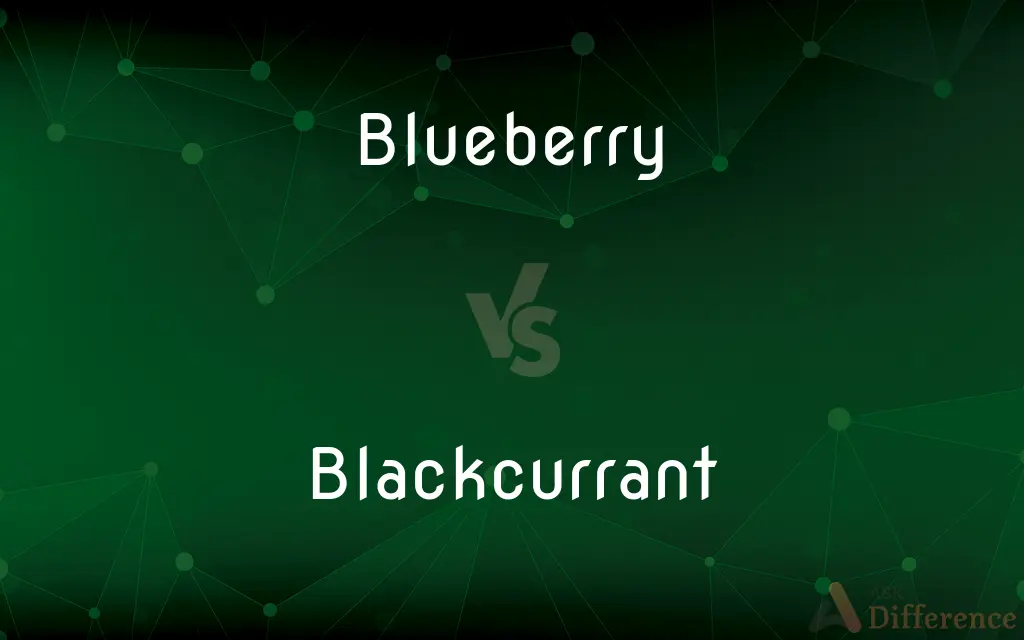Blueberry vs. Blackcurrant — What's the Difference?
By Urooj Arif & Fiza Rafique — Updated on March 12, 2024
Blueberries are small, round, and blue-purple berries, known for their sweet taste and health benefits, while blackcurrants are darker, tart berries, rich in Vitamin C and antioxidants.

Difference Between Blueberry and Blackcurrant
Table of Contents
ADVERTISEMENT
Key Differences
Blueberries are native to North America and have a sweet, slightly tangy flavor. They are often consumed fresh, in baked goods, or as part of various dishes. On the other hand, blackcurrants, with their strong, tart taste, are more commonly found in Europe and Asia and are frequently used in jams, juices, and culinary sauces.
The nutritional profile of blueberries highlights their high fiber content, vitamins C and K, and antioxidant properties, particularly anthocyanins, which contribute to their blue-purple color. Whereas, blackcurrants stand out for their exceptionally high vitamin C content, more potent antioxidant capacity, and higher levels of certain minerals like potassium and iron.
Cultivation practices for blueberries involve well-drained, acidic soils, and they thrive in both wild and cultivated environments. Blackcurrants, however, require cooler temperatures and are more tolerant of damp conditions, which influences their geographical distribution and availability.
In terms of culinary uses, blueberries are versatile, featuring in sweet and savory dishes alike, from muffins and pies to salads. Blackcurrants, due to their tartness, are less commonly eaten fresh and more often found in concentrated forms like syrups, which are used to flavor beverages, desserts, and sauces.
The health benefits associated with blueberries include potential roles in heart health, brain function, and diabetes management. Blackcurrants offer similar benefits, with the added advantage of supporting immune function due to their high vitamin C content.
ADVERTISEMENT
Comparison Chart
Taste
Sweet with a slight tang
Strong and tart
Origin
North America
Europe and Asia
Nutritional Highlights
High in fiber, vitamins C and K
Exceptionally high in vitamin C, potassium, and iron
Cultivation
Prefers acidic, well-drained soils
Tolerates cooler temperatures and damp conditions
Culinary Uses
Fresh, in baked goods, salads
Jams, juices, culinary sauces
Compare with Definitions
Blueberry
A small round berry with a sweet flavor, used in various dishes.
She added fresh blueberries to her morning oatmeal.
Blackcurrant
A dark purple berry known for its tart flavor.
Blackcurrant jam is a popular spread in Europe.
Blueberry
A source of dietary fiber and antioxidants.
Blueberries are often recommended for their health benefits.
Blackcurrant
Not typically eaten fresh due to its tartness.
Fresh blackcurrants are too tart for most people's taste.
Blueberry
Can be eaten fresh or used in cooking.
We picked blueberries to make a fresh fruit salad.
Blackcurrant
Cultivated in cooler climates.
Blackcurrants thrive in the cooler regions of Europe.
Blueberry
Often associated with North American cuisine.
Blueberry pie is a classic American dessert.
Blackcurrant
Commonly used in syrups and beverages.
The cocktail was flavored with blackcurrant syrup.
Blueberry
A common ingredient in baked goods.
The blueberry muffins came out perfectly golden.
Blackcurrant
Rich in vitamin C and antioxidants.
Blackcurrant supplements are taken to boost immune health.
Blueberry
Blueberries are a widely distributed and widespread group of perennial flowering plants with blue or purple berries. They are classified in the section Cyanococcus within the genus Vaccinium.
Blackcurrant
The blackcurrant (Ribes nigrum), also known as black currant or cassis, is a deciduous shrub in the family Grossulariaceae grown for its edible berries. It is native to temperate parts of central and northern Europe and northern Asia, where it prefers damp fertile soils.
Blueberry
A small sweet blue-black edible berry which grows in clusters on North American shrubs related to the bilberry.
Blackcurrant
A small round edible black berry that grows in loose hanging clusters.
Blueberry
One of the dwarf shrubs that produces blueberries, some kinds being cultivated for their fruit or as ornamentals.
Blackcurrant
The widely cultivated shrub that bears blackcurrants.
Blueberry
Any of various plants of the genus Vaccinium, having white to reddish, urn-shaped or tubular flowers and edible blue to blue-black berries, especially the highbush blueberry and the lowbush blueberry.
Blackcurrant
A shrub, Ribes nigrum, that produces small, very dark purple, edible berries.
Blueberry
The fruit of any of these plants.
Blackcurrant
The berry borne by this shrub.
Blueberry
A usually blue-gray spherule that is found in soil and sedimentary rock and is rich in hematite, produced by the weathering of rock or by precipitation from rock by moving groundwater.
Blueberry
(countable) An edible round berry, belonging to the cowberry group (Vaccinium sect. Cyanococcus), with flared crowns at the end, that turns blue on ripening.
Blueberry
(countable) The shrub of the above-mentioned berry.
Blueberry
A dark blue colour.
Blueberry
Of a dark blue colour.
Blueberry
To gather or forage for blueberries.
Blueberry
The berry of several species of Vaccinium, an ericaceous genus, differing from the American huckleberries in containing numerous minute seeds instead of ten nutlets. The commonest species are Vaccinium Pennsylvanicum and Vaccinium vacillans. Vaccinium corymbosum is the tall blueberry.
Blueberry
Any of numerous shrubs of the genus Vaccinium bearing blueberries
Blueberry
Sweet edible dark-blue berries of either low-growing or high-growing blueberry plants
Common Curiosities
Can blackcurrants help with colds?
Yes, the high vitamin C content in blackcurrants can support the immune system, potentially helping to prevent or alleviate colds.
What's the best way to store blueberries to maintain their freshness?
Blueberries should be stored in the refrigerator, preferably in a breathable container, and washed only just before use to maintain freshness.
Why are blueberries considered a superfood?
Blueberries are deemed a superfood due to their high levels of antioxidants, dietary fiber, vitamins, and minerals, contributing to various health benefits.
How can blackcurrants be incorporated into a diet?
Blackcurrants can be used in jams, juices, syrups, and as flavorings in desserts and beverages, although they are less commonly eaten fresh due to their tartness.
Are blueberries and blackcurrants related?
While both are berries, they belong to different botanical families and have distinct flavors, nutritional profiles, and culinary uses.
Can you substitute blueberries for blackcurrants in recipes?
While substitutions can be made, the flavor profile and tartness of blackcurrants differ significantly from the sweeter, milder blueberries, which may affect the recipe outcome.
Are blueberries or blackcurrants easier to grow?
This depends on the climate; blueberries prefer acidic soils and are more tolerant of varied climates, whereas blackcurrants thrive in cooler, damp environments.
Can blueberries and blackcurrants be grown in the same garden?
Yes, but they have different soil and climate preferences, so gardeners need to accommodate these conditions to grow both successfully.
Are there any medicinal uses for blackcurrants?
Blackcurrants have been used in traditional medicine for their anti-inflammatory properties and immune support, particularly due to their high vitamin C content.
Do blueberries or blackcurrants have more antioxidants?
Blackcurrants typically have a higher antioxidant capacity, including greater levels of anthocyanins and vitamin C, compared to blueberries.
What's a simple way to incorporate blueberries into a diet?
Adding fresh blueberries to cereal, yogurt, or smoothies is an easy way to incorporate them into a diet.
Why might someone prefer blackcurrants to blueberries?
Someone might prefer blackcurrants for their stronger, tart flavor, higher vitamin C content, or simply due to personal taste preferences or cultural influences.
How do the health benefits of blueberries and blackcurrants compare?
Both offer significant health benefits, including heart health and immune support, but blackcurrants have an edge in vitamin C content, while blueberries are praised for their antioxidant levels.
Can the leaves of blueberries and blackcurrants be used for anything?
Yes, both blueberry and blackcurrant leaves can be used to make herbal teas, offering potential health benefits.
Do blueberries or blackcurrants have a longer shelf life?
Generally, blueberries have a slightly longer shelf life when stored properly, but both berries are perishable and best consumed within a week of purchase.
Share Your Discovery

Previous Comparison
Notwithstanding vs. Despite
Next Comparison
Cancel vs. DeleteAuthor Spotlight
Written by
Urooj ArifUrooj is a skilled content writer at Ask Difference, known for her exceptional ability to simplify complex topics into engaging and informative content. With a passion for research and a flair for clear, concise writing, she consistently delivers articles that resonate with our diverse audience.
Co-written by
Fiza RafiqueFiza Rafique is a skilled content writer at AskDifference.com, where she meticulously refines and enhances written pieces. Drawing from her vast editorial expertise, Fiza ensures clarity, accuracy, and precision in every article. Passionate about language, she continually seeks to elevate the quality of content for readers worldwide.














































